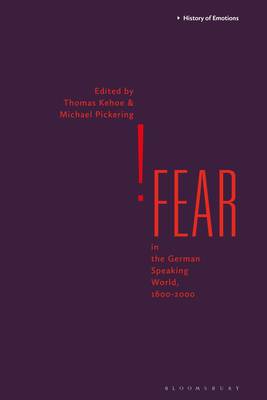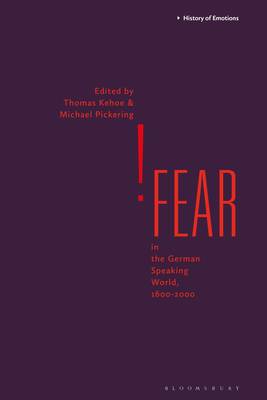
Bedankt voor het vertrouwen het afgelopen jaar! Om jou te bedanken bieden we GRATIS verzending (in België) aan op alles gedurende de hele maand januari.
- Afhalen na 1 uur in een winkel met voorraad
- In januari gratis thuislevering in België
- Ruim aanbod met 7 miljoen producten
Bedankt voor het vertrouwen het afgelopen jaar! Om jou te bedanken bieden we GRATIS verzending (in België) aan op alles gedurende de hele maand januari.
- Afhalen na 1 uur in een winkel met voorraad
- In januari gratis thuislevering in België
- Ruim aanbod met 7 miljoen producten
Zoeken
Fear in the German-Speaking World, 1600-2000
€ 72,95
+ 145 punten
Omschrijving
This book addresses the nature and role of fear in the German world from the early modern period through to the 20th century. Offering the first collection that centres fear in the historical analysis of central Europe since 1600, these essays demonstrate the importance of emotional experience to the study of the past.
Fear has been at the centre of many of the most important historical events in this region; witch hunts, religious conflicts, invasions and ultra-nationalism in the form of the Nazi regime. This book explores ways in which fear was understood, developed and negotiated throughout these historical contexts, and how people of the German world coped with it. From the fear of vampires to the loss of national sovereignty, pestilence, gypsies and criminals, Fear in the German Speaking World1600-2000 draws connections between cases over a period of 400 years and considers fear alongside the history of emotions more generally. In doing so, the chapters reveal a complex, evolving construction of fear that is universally human, but also dependent upon its cultural and historical context.
Fear has been at the centre of many of the most important historical events in this region; witch hunts, religious conflicts, invasions and ultra-nationalism in the form of the Nazi regime. This book explores ways in which fear was understood, developed and negotiated throughout these historical contexts, and how people of the German world coped with it. From the fear of vampires to the loss of national sovereignty, pestilence, gypsies and criminals, Fear in the German Speaking World1600-2000 draws connections between cases over a period of 400 years and considers fear alongside the history of emotions more generally. In doing so, the chapters reveal a complex, evolving construction of fear that is universally human, but also dependent upon its cultural and historical context.
Specificaties
Betrokkenen
- Uitgeverij:
Inhoud
- Aantal bladzijden:
- 256
- Taal:
- Engels
- Reeks:
Eigenschappen
- Productcode (EAN):
- 9781350240452
- Verschijningsdatum:
- 26/08/2021
- Uitvoering:
- Paperback
- Formaat:
- Trade paperback (VS)
- Afmetingen:
- 156 mm x 234 mm
- Gewicht:
- 435 g

Alleen bij Standaard Boekhandel
+ 145 punten op je klantenkaart van Standaard Boekhandel
Beoordelingen
We publiceren alleen reviews die voldoen aan de voorwaarden voor reviews. Bekijk onze voorwaarden voor reviews.








